Terrorism Law: Assessing the Effectiveness of Agreed Definition
VerifiedAdded on 2023/04/21
|11
|3823
|406
Essay
AI Summary
This essay examines the complexities surrounding the establishment of an internationally agreed definition of terrorism and assesses its potential impact on global counter-terrorism efforts. It delves into the challenges posed by differing interpretations of terrorism, the historical evolution of the term, and the political and social contexts that influence its definition. The essay analyzes the arguments for and against a unified definition, considering the perspectives of various nations and international organizations, including the United Nations. It also explores the difficulties in distinguishing between freedom fighters and terrorists, as well as the debate over whether state-sponsored violence should be included in the definition of terrorism. Ultimately, the essay evaluates the extent to which a globally accepted definition of terrorism could enhance the effectiveness of the fight against this complex and multifaceted issue. Desklib offers a wealth of resources for students, including past papers and solved assignments.

qwertyuiopasdfghjklzxcvbnmqw
ertyuiopasdfghjklzxcvbnmqwert
yuiopasdfghjklzxcvbnmqwertyui
opasdfghjklzxcvbnmqwertyuiop
asdfghjklzxcvbnmqwertyuiopasd
fghjklzxcvbnmqwertyuiopasdfgh
jklzxcvbnmqwertyuiopasdfghjkl
zxcvbnmqwertyuiopasdfghjklzxc
vbnmqwertyuiopasdfghjklzxcvb
nmqwertyuiopasdfghjklzxcvbnm
Terrorism Law
ertyuiopasdfghjklzxcvbnmqwert
yuiopasdfghjklzxcvbnmqwertyui
opasdfghjklzxcvbnmqwertyuiop
asdfghjklzxcvbnmqwertyuiopasd
fghjklzxcvbnmqwertyuiopasdfgh
jklzxcvbnmqwertyuiopasdfghjkl
zxcvbnmqwertyuiopasdfghjklzxc
vbnmqwertyuiopasdfghjklzxcvb
nmqwertyuiopasdfghjklzxcvbnm
Terrorism Law
Paraphrase This Document
Need a fresh take? Get an instant paraphrase of this document with our AI Paraphraser
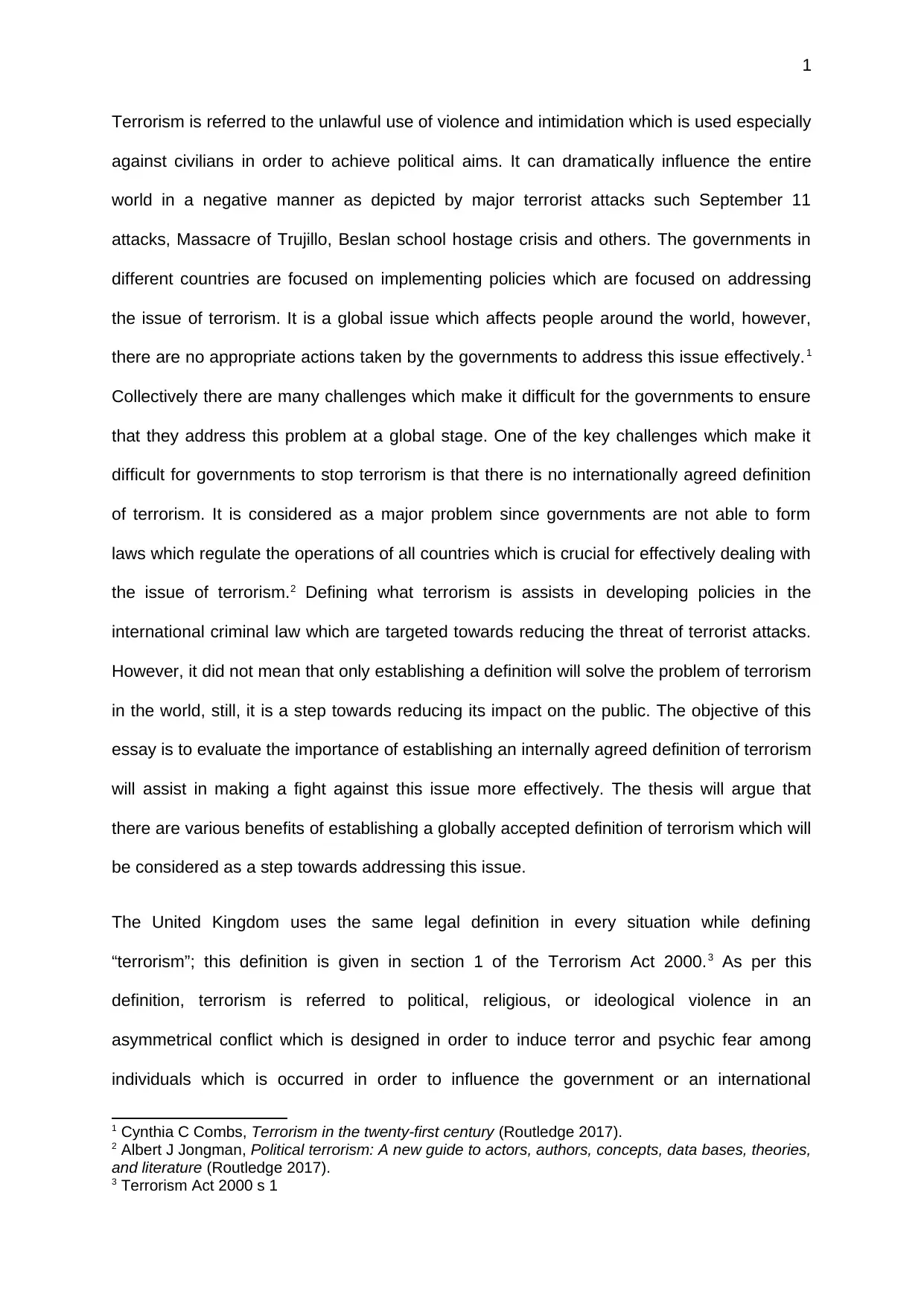
1
Terrorism is referred to the unlawful use of violence and intimidation which is used especially
against civilians in order to achieve political aims. It can dramatically influence the entire
world in a negative manner as depicted by major terrorist attacks such September 11
attacks, Massacre of Trujillo, Beslan school hostage crisis and others. The governments in
different countries are focused on implementing policies which are focused on addressing
the issue of terrorism. It is a global issue which affects people around the world, however,
there are no appropriate actions taken by the governments to address this issue effectively.1
Collectively there are many challenges which make it difficult for the governments to ensure
that they address this problem at a global stage. One of the key challenges which make it
difficult for governments to stop terrorism is that there is no internationally agreed definition
of terrorism. It is considered as a major problem since governments are not able to form
laws which regulate the operations of all countries which is crucial for effectively dealing with
the issue of terrorism.2 Defining what terrorism is assists in developing policies in the
international criminal law which are targeted towards reducing the threat of terrorist attacks.
However, it did not mean that only establishing a definition will solve the problem of terrorism
in the world, still, it is a step towards reducing its impact on the public. The objective of this
essay is to evaluate the importance of establishing an internally agreed definition of terrorism
will assist in making a fight against this issue more effectively. The thesis will argue that
there are various benefits of establishing a globally accepted definition of terrorism which will
be considered as a step towards addressing this issue.
The United Kingdom uses the same legal definition in every situation while defining
“terrorism”; this definition is given in section 1 of the Terrorism Act 2000.3 As per this
definition, terrorism is referred to political, religious, or ideological violence in an
asymmetrical conflict which is designed in order to induce terror and psychic fear among
individuals which is occurred in order to influence the government or an international
1 Cynthia C Combs, Terrorism in the twenty-first century (Routledge 2017).
2 Albert J Jongman, Political terrorism: A new guide to actors, authors, concepts, data bases, theories,
and literature (Routledge 2017).
3 Terrorism Act 2000 s 1
Terrorism is referred to the unlawful use of violence and intimidation which is used especially
against civilians in order to achieve political aims. It can dramatically influence the entire
world in a negative manner as depicted by major terrorist attacks such September 11
attacks, Massacre of Trujillo, Beslan school hostage crisis and others. The governments in
different countries are focused on implementing policies which are focused on addressing
the issue of terrorism. It is a global issue which affects people around the world, however,
there are no appropriate actions taken by the governments to address this issue effectively.1
Collectively there are many challenges which make it difficult for the governments to ensure
that they address this problem at a global stage. One of the key challenges which make it
difficult for governments to stop terrorism is that there is no internationally agreed definition
of terrorism. It is considered as a major problem since governments are not able to form
laws which regulate the operations of all countries which is crucial for effectively dealing with
the issue of terrorism.2 Defining what terrorism is assists in developing policies in the
international criminal law which are targeted towards reducing the threat of terrorist attacks.
However, it did not mean that only establishing a definition will solve the problem of terrorism
in the world, still, it is a step towards reducing its impact on the public. The objective of this
essay is to evaluate the importance of establishing an internally agreed definition of terrorism
will assist in making a fight against this issue more effectively. The thesis will argue that
there are various benefits of establishing a globally accepted definition of terrorism which will
be considered as a step towards addressing this issue.
The United Kingdom uses the same legal definition in every situation while defining
“terrorism”; this definition is given in section 1 of the Terrorism Act 2000.3 As per this
definition, terrorism is referred to political, religious, or ideological violence in an
asymmetrical conflict which is designed in order to induce terror and psychic fear among
individuals which is occurred in order to influence the government or an international
1 Cynthia C Combs, Terrorism in the twenty-first century (Routledge 2017).
2 Albert J Jongman, Political terrorism: A new guide to actors, authors, concepts, data bases, theories,
and literature (Routledge 2017).
3 Terrorism Act 2000 s 1
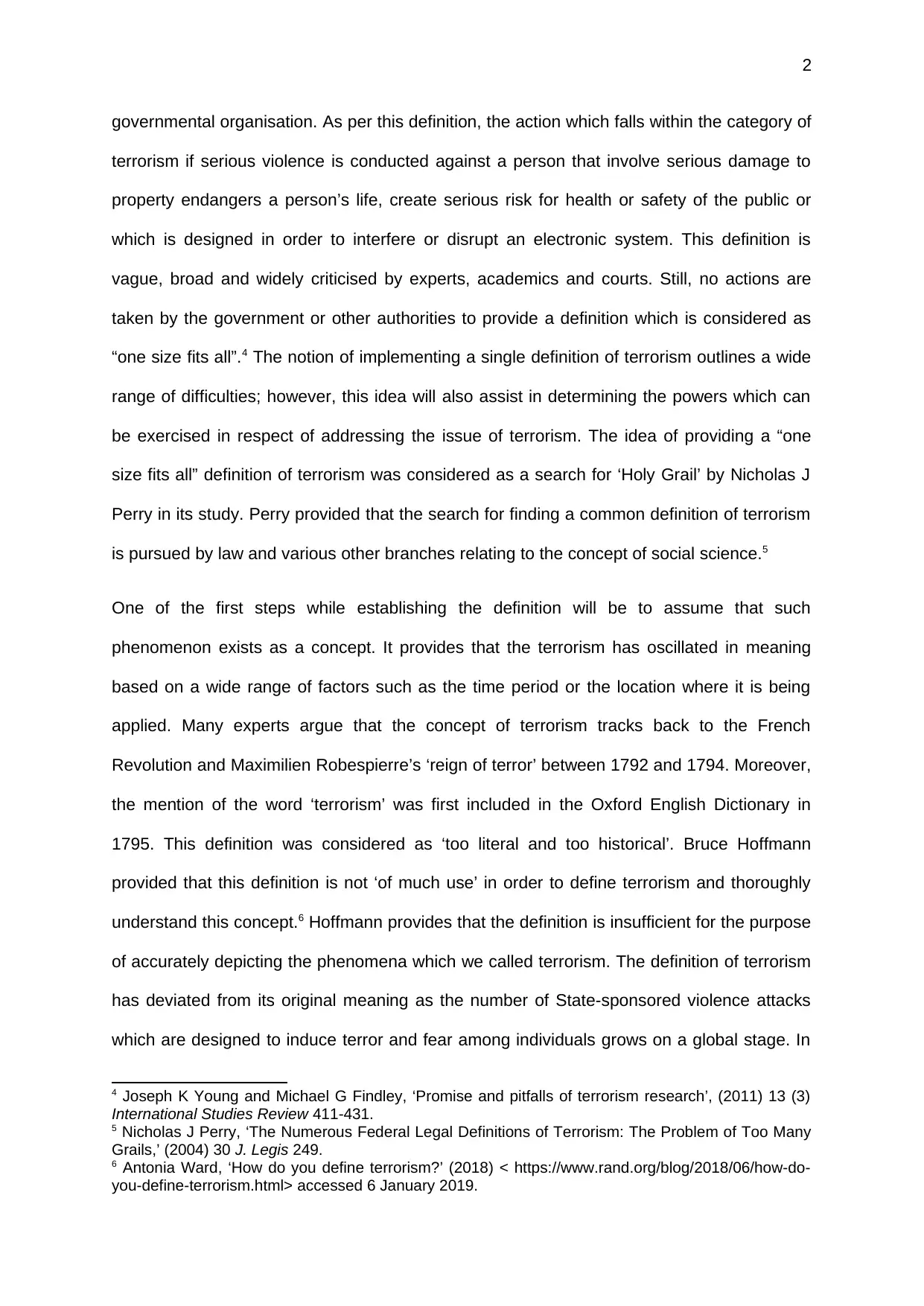
2
governmental organisation. As per this definition, the action which falls within the category of
terrorism if serious violence is conducted against a person that involve serious damage to
property endangers a person’s life, create serious risk for health or safety of the public or
which is designed in order to interfere or disrupt an electronic system. This definition is
vague, broad and widely criticised by experts, academics and courts. Still, no actions are
taken by the government or other authorities to provide a definition which is considered as
“one size fits all”.4 The notion of implementing a single definition of terrorism outlines a wide
range of difficulties; however, this idea will also assist in determining the powers which can
be exercised in respect of addressing the issue of terrorism. The idea of providing a “one
size fits all” definition of terrorism was considered as a search for ‘Holy Grail’ by Nicholas J
Perry in its study. Perry provided that the search for finding a common definition of terrorism
is pursued by law and various other branches relating to the concept of social science.5
One of the first steps while establishing the definition will be to assume that such
phenomenon exists as a concept. It provides that the terrorism has oscillated in meaning
based on a wide range of factors such as the time period or the location where it is being
applied. Many experts argue that the concept of terrorism tracks back to the French
Revolution and Maximilien Robespierre’s ‘reign of terror’ between 1792 and 1794. Moreover,
the mention of the word ‘terrorism’ was first included in the Oxford English Dictionary in
1795. This definition was considered as ‘too literal and too historical’. Bruce Hoffmann
provided that this definition is not ‘of much use’ in order to define terrorism and thoroughly
understand this concept.6 Hoffmann provides that the definition is insufficient for the purpose
of accurately depicting the phenomena which we called terrorism. The definition of terrorism
has deviated from its original meaning as the number of State-sponsored violence attacks
which are designed to induce terror and fear among individuals grows on a global stage. In
4 Joseph K Young and Michael G Findley, ‘Promise and pitfalls of terrorism research’, (2011) 13 (3)
International Studies Review 411-431.
5 Nicholas J Perry, ‘The Numerous Federal Legal Definitions of Terrorism: The Problem of Too Many
Grails,’ (2004) 30 J. Legis 249.
6 Antonia Ward, ‘How do you define terrorism?’ (2018) < https://www.rand.org/blog/2018/06/how-do-
you-define-terrorism.html> accessed 6 January 2019.
governmental organisation. As per this definition, the action which falls within the category of
terrorism if serious violence is conducted against a person that involve serious damage to
property endangers a person’s life, create serious risk for health or safety of the public or
which is designed in order to interfere or disrupt an electronic system. This definition is
vague, broad and widely criticised by experts, academics and courts. Still, no actions are
taken by the government or other authorities to provide a definition which is considered as
“one size fits all”.4 The notion of implementing a single definition of terrorism outlines a wide
range of difficulties; however, this idea will also assist in determining the powers which can
be exercised in respect of addressing the issue of terrorism. The idea of providing a “one
size fits all” definition of terrorism was considered as a search for ‘Holy Grail’ by Nicholas J
Perry in its study. Perry provided that the search for finding a common definition of terrorism
is pursued by law and various other branches relating to the concept of social science.5
One of the first steps while establishing the definition will be to assume that such
phenomenon exists as a concept. It provides that the terrorism has oscillated in meaning
based on a wide range of factors such as the time period or the location where it is being
applied. Many experts argue that the concept of terrorism tracks back to the French
Revolution and Maximilien Robespierre’s ‘reign of terror’ between 1792 and 1794. Moreover,
the mention of the word ‘terrorism’ was first included in the Oxford English Dictionary in
1795. This definition was considered as ‘too literal and too historical’. Bruce Hoffmann
provided that this definition is not ‘of much use’ in order to define terrorism and thoroughly
understand this concept.6 Hoffmann provides that the definition is insufficient for the purpose
of accurately depicting the phenomena which we called terrorism. The definition of terrorism
has deviated from its original meaning as the number of State-sponsored violence attacks
which are designed to induce terror and fear among individuals grows on a global stage. In
4 Joseph K Young and Michael G Findley, ‘Promise and pitfalls of terrorism research’, (2011) 13 (3)
International Studies Review 411-431.
5 Nicholas J Perry, ‘The Numerous Federal Legal Definitions of Terrorism: The Problem of Too Many
Grails,’ (2004) 30 J. Legis 249.
6 Antonia Ward, ‘How do you define terrorism?’ (2018) < https://www.rand.org/blog/2018/06/how-do-
you-define-terrorism.html> accessed 6 January 2019.
⊘ This is a preview!⊘
Do you want full access?
Subscribe today to unlock all pages.

Trusted by 1+ million students worldwide
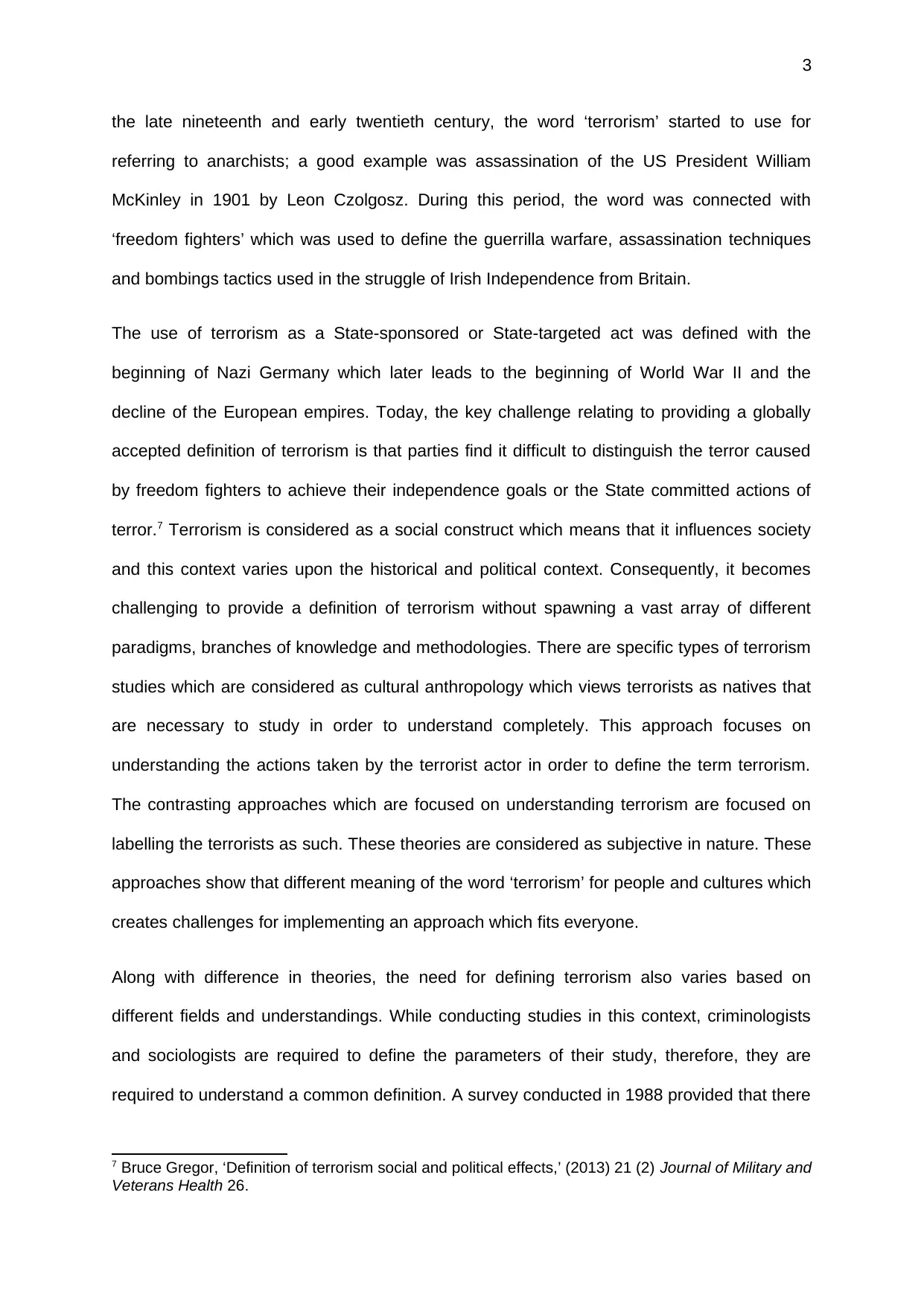
3
the late nineteenth and early twentieth century, the word ‘terrorism’ started to use for
referring to anarchists; a good example was assassination of the US President William
McKinley in 1901 by Leon Czolgosz. During this period, the word was connected with
‘freedom fighters’ which was used to define the guerrilla warfare, assassination techniques
and bombings tactics used in the struggle of Irish Independence from Britain.
The use of terrorism as a State-sponsored or State-targeted act was defined with the
beginning of Nazi Germany which later leads to the beginning of World War II and the
decline of the European empires. Today, the key challenge relating to providing a globally
accepted definition of terrorism is that parties find it difficult to distinguish the terror caused
by freedom fighters to achieve their independence goals or the State committed actions of
terror.7 Terrorism is considered as a social construct which means that it influences society
and this context varies upon the historical and political context. Consequently, it becomes
challenging to provide a definition of terrorism without spawning a vast array of different
paradigms, branches of knowledge and methodologies. There are specific types of terrorism
studies which are considered as cultural anthropology which views terrorists as natives that
are necessary to study in order to understand completely. This approach focuses on
understanding the actions taken by the terrorist actor in order to define the term terrorism.
The contrasting approaches which are focused on understanding terrorism are focused on
labelling the terrorists as such. These theories are considered as subjective in nature. These
approaches show that different meaning of the word ‘terrorism’ for people and cultures which
creates challenges for implementing an approach which fits everyone.
Along with difference in theories, the need for defining terrorism also varies based on
different fields and understandings. While conducting studies in this context, criminologists
and sociologists are required to define the parameters of their study, therefore, they are
required to understand a common definition. A survey conducted in 1988 provided that there
7 Bruce Gregor, ‘Definition of terrorism social and political effects,’ (2013) 21 (2) Journal of Military and
Veterans Health 26.
the late nineteenth and early twentieth century, the word ‘terrorism’ started to use for
referring to anarchists; a good example was assassination of the US President William
McKinley in 1901 by Leon Czolgosz. During this period, the word was connected with
‘freedom fighters’ which was used to define the guerrilla warfare, assassination techniques
and bombings tactics used in the struggle of Irish Independence from Britain.
The use of terrorism as a State-sponsored or State-targeted act was defined with the
beginning of Nazi Germany which later leads to the beginning of World War II and the
decline of the European empires. Today, the key challenge relating to providing a globally
accepted definition of terrorism is that parties find it difficult to distinguish the terror caused
by freedom fighters to achieve their independence goals or the State committed actions of
terror.7 Terrorism is considered as a social construct which means that it influences society
and this context varies upon the historical and political context. Consequently, it becomes
challenging to provide a definition of terrorism without spawning a vast array of different
paradigms, branches of knowledge and methodologies. There are specific types of terrorism
studies which are considered as cultural anthropology which views terrorists as natives that
are necessary to study in order to understand completely. This approach focuses on
understanding the actions taken by the terrorist actor in order to define the term terrorism.
The contrasting approaches which are focused on understanding terrorism are focused on
labelling the terrorists as such. These theories are considered as subjective in nature. These
approaches show that different meaning of the word ‘terrorism’ for people and cultures which
creates challenges for implementing an approach which fits everyone.
Along with difference in theories, the need for defining terrorism also varies based on
different fields and understandings. While conducting studies in this context, criminologists
and sociologists are required to define the parameters of their study, therefore, they are
required to understand a common definition. A survey conducted in 1988 provided that there
7 Bruce Gregor, ‘Definition of terrorism social and political effects,’ (2013) 21 (2) Journal of Military and
Veterans Health 26.
Paraphrase This Document
Need a fresh take? Get an instant paraphrase of this document with our AI Paraphraser
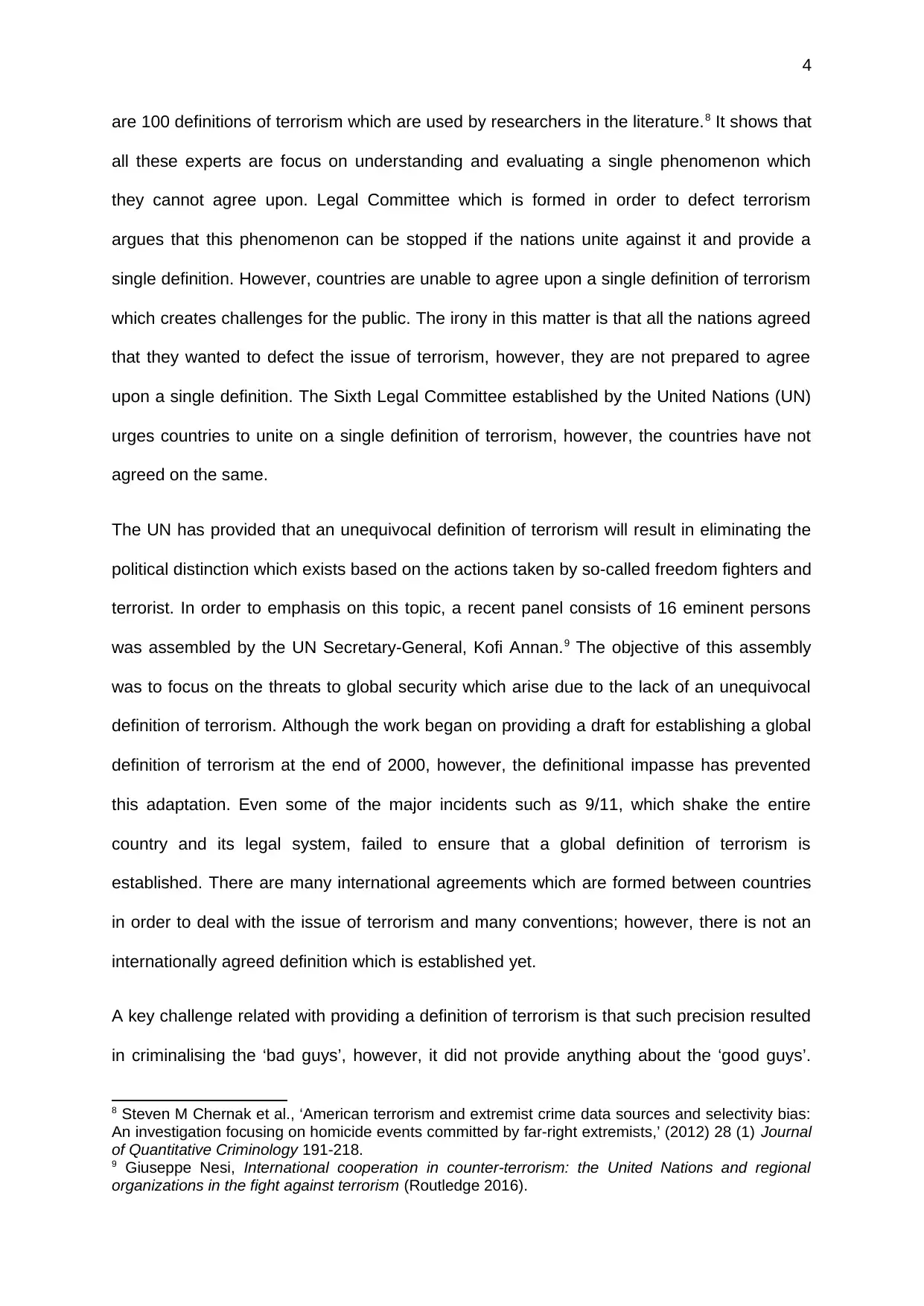
4
are 100 definitions of terrorism which are used by researchers in the literature.8 It shows that
all these experts are focus on understanding and evaluating a single phenomenon which
they cannot agree upon. Legal Committee which is formed in order to defect terrorism
argues that this phenomenon can be stopped if the nations unite against it and provide a
single definition. However, countries are unable to agree upon a single definition of terrorism
which creates challenges for the public. The irony in this matter is that all the nations agreed
that they wanted to defect the issue of terrorism, however, they are not prepared to agree
upon a single definition. The Sixth Legal Committee established by the United Nations (UN)
urges countries to unite on a single definition of terrorism, however, the countries have not
agreed on the same.
The UN has provided that an unequivocal definition of terrorism will result in eliminating the
political distinction which exists based on the actions taken by so-called freedom fighters and
terrorist. In order to emphasis on this topic, a recent panel consists of 16 eminent persons
was assembled by the UN Secretary-General, Kofi Annan.9 The objective of this assembly
was to focus on the threats to global security which arise due to the lack of an unequivocal
definition of terrorism. Although the work began on providing a draft for establishing a global
definition of terrorism at the end of 2000, however, the definitional impasse has prevented
this adaptation. Even some of the major incidents such as 9/11, which shake the entire
country and its legal system, failed to ensure that a global definition of terrorism is
established. There are many international agreements which are formed between countries
in order to deal with the issue of terrorism and many conventions; however, there is not an
internationally agreed definition which is established yet.
A key challenge related with providing a definition of terrorism is that such precision resulted
in criminalising the ‘bad guys’, however, it did not provide anything about the ‘good guys’.
8 Steven M Chernak et al., ‘American terrorism and extremist crime data sources and selectivity bias:
An investigation focusing on homicide events committed by far-right extremists,’ (2012) 28 (1) Journal
of Quantitative Criminology 191-218.
9 Giuseppe Nesi, International cooperation in counter-terrorism: the United Nations and regional
organizations in the fight against terrorism (Routledge 2016).
are 100 definitions of terrorism which are used by researchers in the literature.8 It shows that
all these experts are focus on understanding and evaluating a single phenomenon which
they cannot agree upon. Legal Committee which is formed in order to defect terrorism
argues that this phenomenon can be stopped if the nations unite against it and provide a
single definition. However, countries are unable to agree upon a single definition of terrorism
which creates challenges for the public. The irony in this matter is that all the nations agreed
that they wanted to defect the issue of terrorism, however, they are not prepared to agree
upon a single definition. The Sixth Legal Committee established by the United Nations (UN)
urges countries to unite on a single definition of terrorism, however, the countries have not
agreed on the same.
The UN has provided that an unequivocal definition of terrorism will result in eliminating the
political distinction which exists based on the actions taken by so-called freedom fighters and
terrorist. In order to emphasis on this topic, a recent panel consists of 16 eminent persons
was assembled by the UN Secretary-General, Kofi Annan.9 The objective of this assembly
was to focus on the threats to global security which arise due to the lack of an unequivocal
definition of terrorism. Although the work began on providing a draft for establishing a global
definition of terrorism at the end of 2000, however, the definitional impasse has prevented
this adaptation. Even some of the major incidents such as 9/11, which shake the entire
country and its legal system, failed to ensure that a global definition of terrorism is
established. There are many international agreements which are formed between countries
in order to deal with the issue of terrorism and many conventions; however, there is not an
internationally agreed definition which is established yet.
A key challenge related with providing a definition of terrorism is that such precision resulted
in criminalising the ‘bad guys’, however, it did not provide anything about the ‘good guys’.
8 Steven M Chernak et al., ‘American terrorism and extremist crime data sources and selectivity bias:
An investigation focusing on homicide events committed by far-right extremists,’ (2012) 28 (1) Journal
of Quantitative Criminology 191-218.
9 Giuseppe Nesi, International cooperation in counter-terrorism: the United Nations and regional
organizations in the fight against terrorism (Routledge 2016).
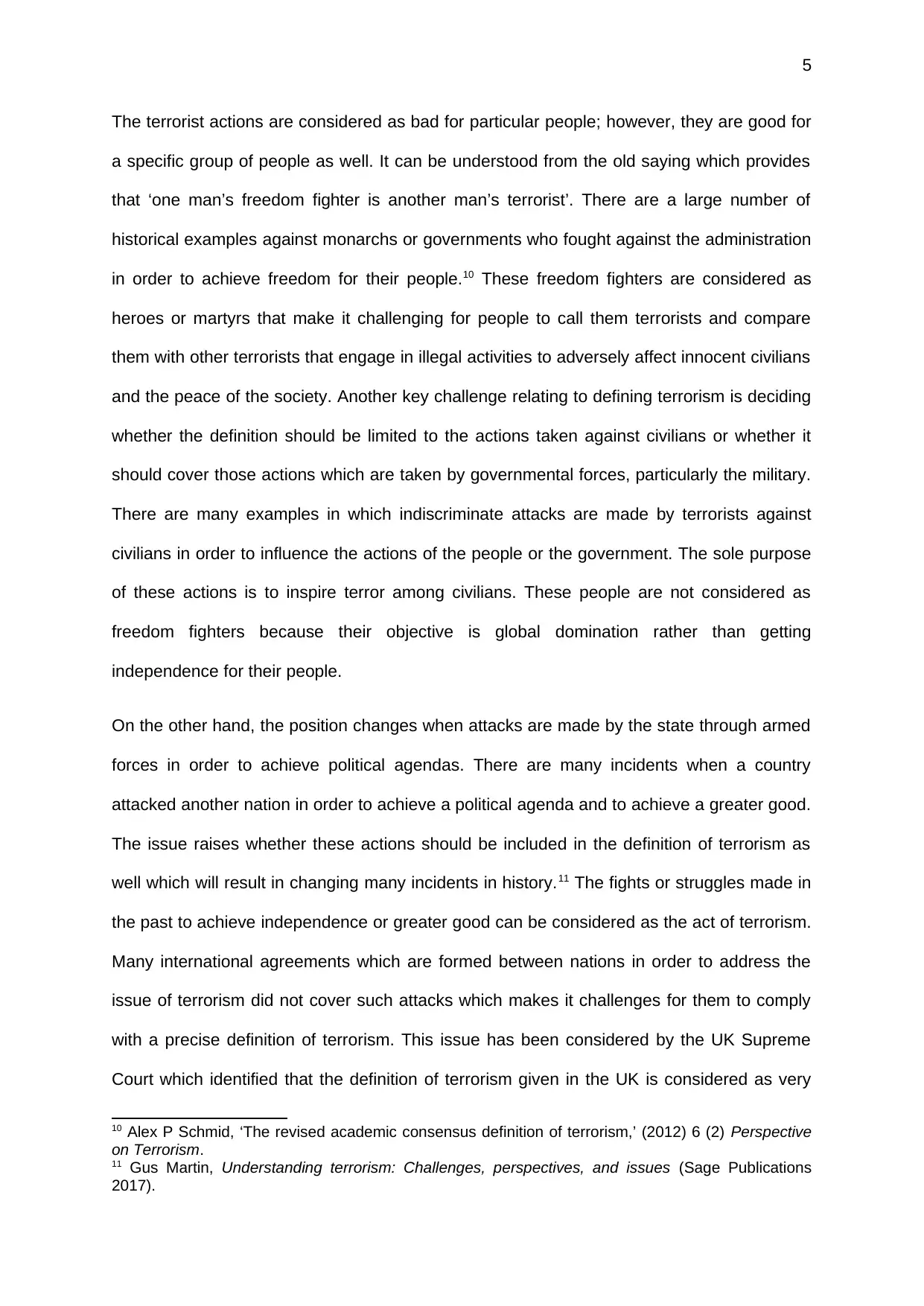
5
The terrorist actions are considered as bad for particular people; however, they are good for
a specific group of people as well. It can be understood from the old saying which provides
that ‘one man’s freedom fighter is another man’s terrorist’. There are a large number of
historical examples against monarchs or governments who fought against the administration
in order to achieve freedom for their people.10 These freedom fighters are considered as
heroes or martyrs that make it challenging for people to call them terrorists and compare
them with other terrorists that engage in illegal activities to adversely affect innocent civilians
and the peace of the society. Another key challenge relating to defining terrorism is deciding
whether the definition should be limited to the actions taken against civilians or whether it
should cover those actions which are taken by governmental forces, particularly the military.
There are many examples in which indiscriminate attacks are made by terrorists against
civilians in order to influence the actions of the people or the government. The sole purpose
of these actions is to inspire terror among civilians. These people are not considered as
freedom fighters because their objective is global domination rather than getting
independence for their people.
On the other hand, the position changes when attacks are made by the state through armed
forces in order to achieve political agendas. There are many incidents when a country
attacked another nation in order to achieve a political agenda and to achieve a greater good.
The issue raises whether these actions should be included in the definition of terrorism as
well which will result in changing many incidents in history.11 The fights or struggles made in
the past to achieve independence or greater good can be considered as the act of terrorism.
Many international agreements which are formed between nations in order to address the
issue of terrorism did not cover such attacks which makes it challenges for them to comply
with a precise definition of terrorism. This issue has been considered by the UK Supreme
Court which identified that the definition of terrorism given in the UK is considered as very
10 Alex P Schmid, ‘The revised academic consensus definition of terrorism,’ (2012) 6 (2) Perspective
on Terrorism.
11 Gus Martin, Understanding terrorism: Challenges, perspectives, and issues (Sage Publications
2017).
The terrorist actions are considered as bad for particular people; however, they are good for
a specific group of people as well. It can be understood from the old saying which provides
that ‘one man’s freedom fighter is another man’s terrorist’. There are a large number of
historical examples against monarchs or governments who fought against the administration
in order to achieve freedom for their people.10 These freedom fighters are considered as
heroes or martyrs that make it challenging for people to call them terrorists and compare
them with other terrorists that engage in illegal activities to adversely affect innocent civilians
and the peace of the society. Another key challenge relating to defining terrorism is deciding
whether the definition should be limited to the actions taken against civilians or whether it
should cover those actions which are taken by governmental forces, particularly the military.
There are many examples in which indiscriminate attacks are made by terrorists against
civilians in order to influence the actions of the people or the government. The sole purpose
of these actions is to inspire terror among civilians. These people are not considered as
freedom fighters because their objective is global domination rather than getting
independence for their people.
On the other hand, the position changes when attacks are made by the state through armed
forces in order to achieve political agendas. There are many incidents when a country
attacked another nation in order to achieve a political agenda and to achieve a greater good.
The issue raises whether these actions should be included in the definition of terrorism as
well which will result in changing many incidents in history.11 The fights or struggles made in
the past to achieve independence or greater good can be considered as the act of terrorism.
Many international agreements which are formed between nations in order to address the
issue of terrorism did not cover such attacks which makes it challenges for them to comply
with a precise definition of terrorism. This issue has been considered by the UK Supreme
Court which identified that the definition of terrorism given in the UK is considered as very
10 Alex P Schmid, ‘The revised academic consensus definition of terrorism,’ (2012) 6 (2) Perspective
on Terrorism.
11 Gus Martin, Understanding terrorism: Challenges, perspectives, and issues (Sage Publications
2017).
⊘ This is a preview!⊘
Do you want full access?
Subscribe today to unlock all pages.

Trusted by 1+ million students worldwide
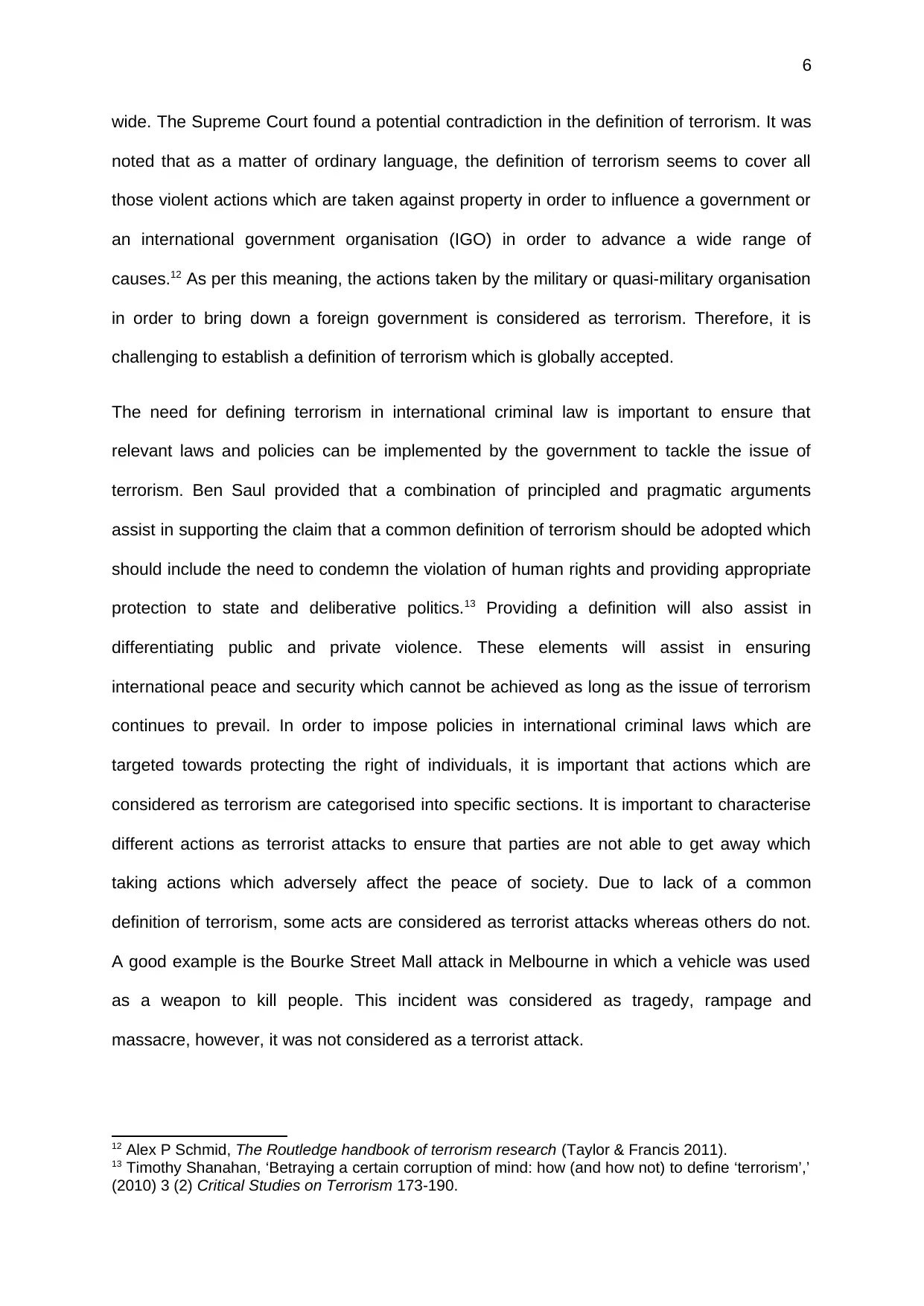
6
wide. The Supreme Court found a potential contradiction in the definition of terrorism. It was
noted that as a matter of ordinary language, the definition of terrorism seems to cover all
those violent actions which are taken against property in order to influence a government or
an international government organisation (IGO) in order to advance a wide range of
causes.12 As per this meaning, the actions taken by the military or quasi-military organisation
in order to bring down a foreign government is considered as terrorism. Therefore, it is
challenging to establish a definition of terrorism which is globally accepted.
The need for defining terrorism in international criminal law is important to ensure that
relevant laws and policies can be implemented by the government to tackle the issue of
terrorism. Ben Saul provided that a combination of principled and pragmatic arguments
assist in supporting the claim that a common definition of terrorism should be adopted which
should include the need to condemn the violation of human rights and providing appropriate
protection to state and deliberative politics.13 Providing a definition will also assist in
differentiating public and private violence. These elements will assist in ensuring
international peace and security which cannot be achieved as long as the issue of terrorism
continues to prevail. In order to impose policies in international criminal laws which are
targeted towards protecting the right of individuals, it is important that actions which are
considered as terrorism are categorised into specific sections. It is important to characterise
different actions as terrorist attacks to ensure that parties are not able to get away which
taking actions which adversely affect the peace of society. Due to lack of a common
definition of terrorism, some acts are considered as terrorist attacks whereas others do not.
A good example is the Bourke Street Mall attack in Melbourne in which a vehicle was used
as a weapon to kill people. This incident was considered as tragedy, rampage and
massacre, however, it was not considered as a terrorist attack.
12 Alex P Schmid, The Routledge handbook of terrorism research (Taylor & Francis 2011).
13 Timothy Shanahan, ‘Betraying a certain corruption of mind: how (and how not) to define ‘terrorism’,’
(2010) 3 (2) Critical Studies on Terrorism 173-190.
wide. The Supreme Court found a potential contradiction in the definition of terrorism. It was
noted that as a matter of ordinary language, the definition of terrorism seems to cover all
those violent actions which are taken against property in order to influence a government or
an international government organisation (IGO) in order to advance a wide range of
causes.12 As per this meaning, the actions taken by the military or quasi-military organisation
in order to bring down a foreign government is considered as terrorism. Therefore, it is
challenging to establish a definition of terrorism which is globally accepted.
The need for defining terrorism in international criminal law is important to ensure that
relevant laws and policies can be implemented by the government to tackle the issue of
terrorism. Ben Saul provided that a combination of principled and pragmatic arguments
assist in supporting the claim that a common definition of terrorism should be adopted which
should include the need to condemn the violation of human rights and providing appropriate
protection to state and deliberative politics.13 Providing a definition will also assist in
differentiating public and private violence. These elements will assist in ensuring
international peace and security which cannot be achieved as long as the issue of terrorism
continues to prevail. In order to impose policies in international criminal laws which are
targeted towards protecting the right of individuals, it is important that actions which are
considered as terrorism are categorised into specific sections. It is important to characterise
different actions as terrorist attacks to ensure that parties are not able to get away which
taking actions which adversely affect the peace of society. Due to lack of a common
definition of terrorism, some acts are considered as terrorist attacks whereas others do not.
A good example is the Bourke Street Mall attack in Melbourne in which a vehicle was used
as a weapon to kill people. This incident was considered as tragedy, rampage and
massacre, however, it was not considered as a terrorist attack.
12 Alex P Schmid, The Routledge handbook of terrorism research (Taylor & Francis 2011).
13 Timothy Shanahan, ‘Betraying a certain corruption of mind: how (and how not) to define ‘terrorism’,’
(2010) 3 (2) Critical Studies on Terrorism 173-190.
Paraphrase This Document
Need a fresh take? Get an instant paraphrase of this document with our AI Paraphraser
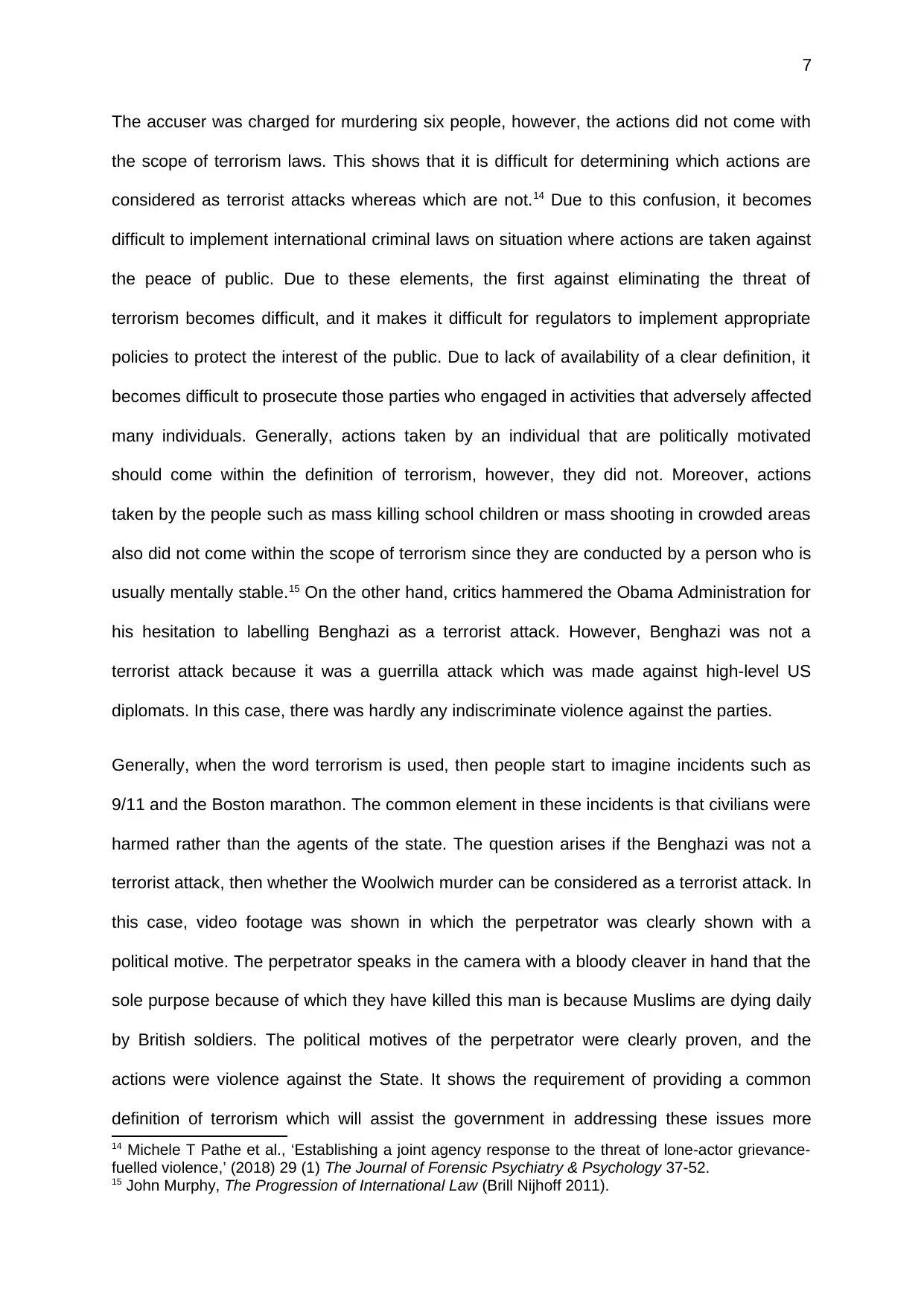
7
The accuser was charged for murdering six people, however, the actions did not come with
the scope of terrorism laws. This shows that it is difficult for determining which actions are
considered as terrorist attacks whereas which are not.14 Due to this confusion, it becomes
difficult to implement international criminal laws on situation where actions are taken against
the peace of public. Due to these elements, the first against eliminating the threat of
terrorism becomes difficult, and it makes it difficult for regulators to implement appropriate
policies to protect the interest of the public. Due to lack of availability of a clear definition, it
becomes difficult to prosecute those parties who engaged in activities that adversely affected
many individuals. Generally, actions taken by an individual that are politically motivated
should come within the definition of terrorism, however, they did not. Moreover, actions
taken by the people such as mass killing school children or mass shooting in crowded areas
also did not come within the scope of terrorism since they are conducted by a person who is
usually mentally stable.15 On the other hand, critics hammered the Obama Administration for
his hesitation to labelling Benghazi as a terrorist attack. However, Benghazi was not a
terrorist attack because it was a guerrilla attack which was made against high-level US
diplomats. In this case, there was hardly any indiscriminate violence against the parties.
Generally, when the word terrorism is used, then people start to imagine incidents such as
9/11 and the Boston marathon. The common element in these incidents is that civilians were
harmed rather than the agents of the state. The question arises if the Benghazi was not a
terrorist attack, then whether the Woolwich murder can be considered as a terrorist attack. In
this case, video footage was shown in which the perpetrator was clearly shown with a
political motive. The perpetrator speaks in the camera with a bloody cleaver in hand that the
sole purpose because of which they have killed this man is because Muslims are dying daily
by British soldiers. The political motives of the perpetrator were clearly proven, and the
actions were violence against the State. It shows the requirement of providing a common
definition of terrorism which will assist the government in addressing these issues more
14 Michele T Pathe et al., ‘Establishing a joint agency response to the threat of lone-actor grievance-
fuelled violence,’ (2018) 29 (1) The Journal of Forensic Psychiatry & Psychology 37-52.
15 John Murphy, The Progression of International Law (Brill Nijhoff 2011).
The accuser was charged for murdering six people, however, the actions did not come with
the scope of terrorism laws. This shows that it is difficult for determining which actions are
considered as terrorist attacks whereas which are not.14 Due to this confusion, it becomes
difficult to implement international criminal laws on situation where actions are taken against
the peace of public. Due to these elements, the first against eliminating the threat of
terrorism becomes difficult, and it makes it difficult for regulators to implement appropriate
policies to protect the interest of the public. Due to lack of availability of a clear definition, it
becomes difficult to prosecute those parties who engaged in activities that adversely affected
many individuals. Generally, actions taken by an individual that are politically motivated
should come within the definition of terrorism, however, they did not. Moreover, actions
taken by the people such as mass killing school children or mass shooting in crowded areas
also did not come within the scope of terrorism since they are conducted by a person who is
usually mentally stable.15 On the other hand, critics hammered the Obama Administration for
his hesitation to labelling Benghazi as a terrorist attack. However, Benghazi was not a
terrorist attack because it was a guerrilla attack which was made against high-level US
diplomats. In this case, there was hardly any indiscriminate violence against the parties.
Generally, when the word terrorism is used, then people start to imagine incidents such as
9/11 and the Boston marathon. The common element in these incidents is that civilians were
harmed rather than the agents of the state. The question arises if the Benghazi was not a
terrorist attack, then whether the Woolwich murder can be considered as a terrorist attack. In
this case, video footage was shown in which the perpetrator was clearly shown with a
political motive. The perpetrator speaks in the camera with a bloody cleaver in hand that the
sole purpose because of which they have killed this man is because Muslims are dying daily
by British soldiers. The political motives of the perpetrator were clearly proven, and the
actions were violence against the State. It shows the requirement of providing a common
definition of terrorism which will assist the government in addressing these issues more
14 Michele T Pathe et al., ‘Establishing a joint agency response to the threat of lone-actor grievance-
fuelled violence,’ (2018) 29 (1) The Journal of Forensic Psychiatry & Psychology 37-52.
15 John Murphy, The Progression of International Law (Brill Nijhoff 2011).
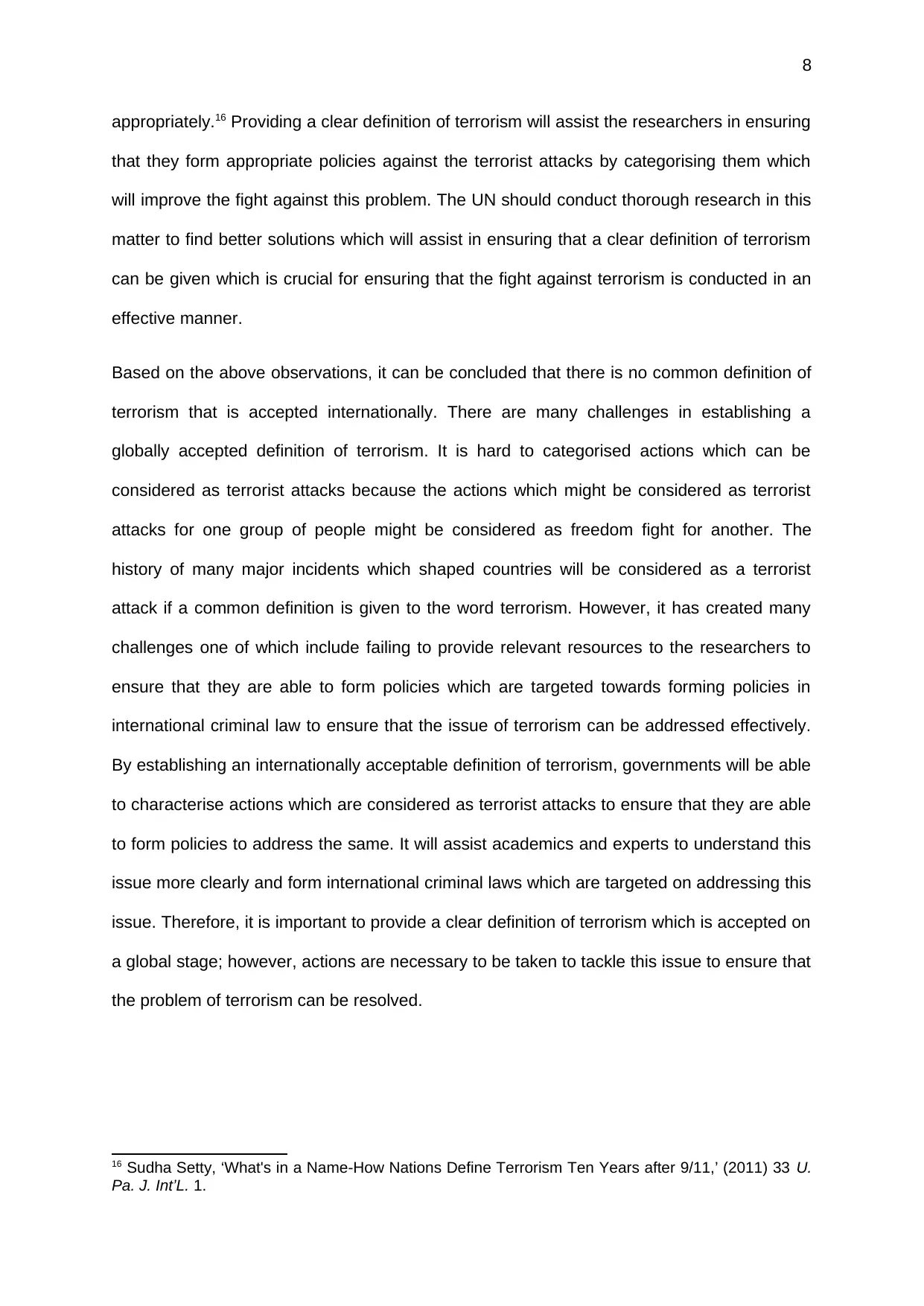
8
appropriately.16 Providing a clear definition of terrorism will assist the researchers in ensuring
that they form appropriate policies against the terrorist attacks by categorising them which
will improve the fight against this problem. The UN should conduct thorough research in this
matter to find better solutions which will assist in ensuring that a clear definition of terrorism
can be given which is crucial for ensuring that the fight against terrorism is conducted in an
effective manner.
Based on the above observations, it can be concluded that there is no common definition of
terrorism that is accepted internationally. There are many challenges in establishing a
globally accepted definition of terrorism. It is hard to categorised actions which can be
considered as terrorist attacks because the actions which might be considered as terrorist
attacks for one group of people might be considered as freedom fight for another. The
history of many major incidents which shaped countries will be considered as a terrorist
attack if a common definition is given to the word terrorism. However, it has created many
challenges one of which include failing to provide relevant resources to the researchers to
ensure that they are able to form policies which are targeted towards forming policies in
international criminal law to ensure that the issue of terrorism can be addressed effectively.
By establishing an internationally acceptable definition of terrorism, governments will be able
to characterise actions which are considered as terrorist attacks to ensure that they are able
to form policies to address the same. It will assist academics and experts to understand this
issue more clearly and form international criminal laws which are targeted on addressing this
issue. Therefore, it is important to provide a clear definition of terrorism which is accepted on
a global stage; however, actions are necessary to be taken to tackle this issue to ensure that
the problem of terrorism can be resolved.
16 Sudha Setty, ‘What's in a Name-How Nations Define Terrorism Ten Years after 9/11,’ (2011) 33 U.
Pa. J. Int’L. 1.
appropriately.16 Providing a clear definition of terrorism will assist the researchers in ensuring
that they form appropriate policies against the terrorist attacks by categorising them which
will improve the fight against this problem. The UN should conduct thorough research in this
matter to find better solutions which will assist in ensuring that a clear definition of terrorism
can be given which is crucial for ensuring that the fight against terrorism is conducted in an
effective manner.
Based on the above observations, it can be concluded that there is no common definition of
terrorism that is accepted internationally. There are many challenges in establishing a
globally accepted definition of terrorism. It is hard to categorised actions which can be
considered as terrorist attacks because the actions which might be considered as terrorist
attacks for one group of people might be considered as freedom fight for another. The
history of many major incidents which shaped countries will be considered as a terrorist
attack if a common definition is given to the word terrorism. However, it has created many
challenges one of which include failing to provide relevant resources to the researchers to
ensure that they are able to form policies which are targeted towards forming policies in
international criminal law to ensure that the issue of terrorism can be addressed effectively.
By establishing an internationally acceptable definition of terrorism, governments will be able
to characterise actions which are considered as terrorist attacks to ensure that they are able
to form policies to address the same. It will assist academics and experts to understand this
issue more clearly and form international criminal laws which are targeted on addressing this
issue. Therefore, it is important to provide a clear definition of terrorism which is accepted on
a global stage; however, actions are necessary to be taken to tackle this issue to ensure that
the problem of terrorism can be resolved.
16 Sudha Setty, ‘What's in a Name-How Nations Define Terrorism Ten Years after 9/11,’ (2011) 33 U.
Pa. J. Int’L. 1.
⊘ This is a preview!⊘
Do you want full access?
Subscribe today to unlock all pages.

Trusted by 1+ million students worldwide
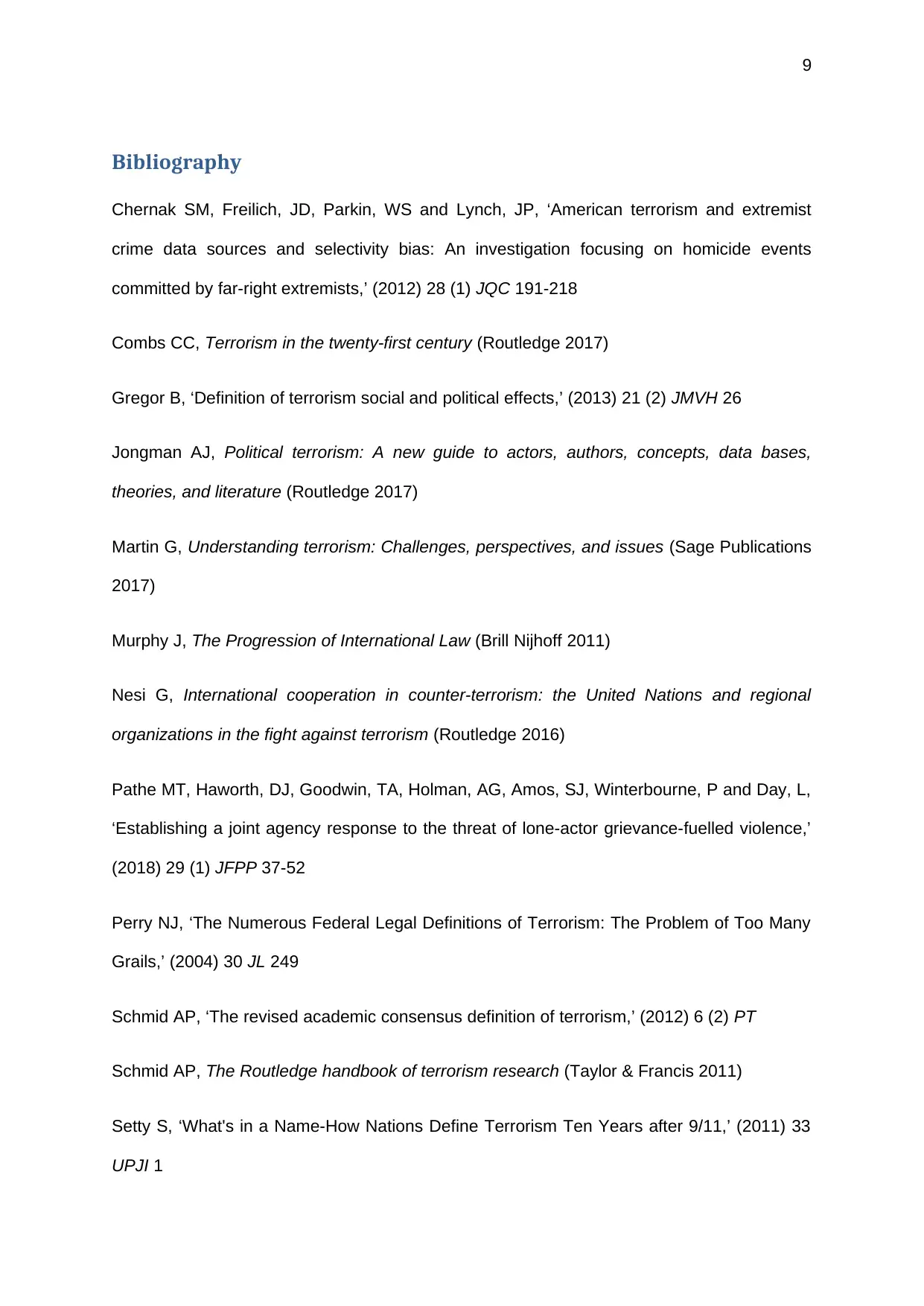
9
Bibliography
Chernak SM, Freilich, JD, Parkin, WS and Lynch, JP, ‘American terrorism and extremist
crime data sources and selectivity bias: An investigation focusing on homicide events
committed by far-right extremists,’ (2012) 28 (1) JQC 191-218
Combs CC, Terrorism in the twenty-first century (Routledge 2017)
Gregor B, ‘Definition of terrorism social and political effects,’ (2013) 21 (2) JMVH 26
Jongman AJ, Political terrorism: A new guide to actors, authors, concepts, data bases,
theories, and literature (Routledge 2017)
Martin G, Understanding terrorism: Challenges, perspectives, and issues (Sage Publications
2017)
Murphy J, The Progression of International Law (Brill Nijhoff 2011)
Nesi G, International cooperation in counter-terrorism: the United Nations and regional
organizations in the fight against terrorism (Routledge 2016)
Pathe MT, Haworth, DJ, Goodwin, TA, Holman, AG, Amos, SJ, Winterbourne, P and Day, L,
‘Establishing a joint agency response to the threat of lone-actor grievance-fuelled violence,’
(2018) 29 (1) JFPP 37-52
Perry NJ, ‘The Numerous Federal Legal Definitions of Terrorism: The Problem of Too Many
Grails,’ (2004) 30 JL 249
Schmid AP, ‘The revised academic consensus definition of terrorism,’ (2012) 6 (2) PT
Schmid AP, The Routledge handbook of terrorism research (Taylor & Francis 2011)
Setty S, ‘What's in a Name-How Nations Define Terrorism Ten Years after 9/11,’ (2011) 33
UPJI 1
Bibliography
Chernak SM, Freilich, JD, Parkin, WS and Lynch, JP, ‘American terrorism and extremist
crime data sources and selectivity bias: An investigation focusing on homicide events
committed by far-right extremists,’ (2012) 28 (1) JQC 191-218
Combs CC, Terrorism in the twenty-first century (Routledge 2017)
Gregor B, ‘Definition of terrorism social and political effects,’ (2013) 21 (2) JMVH 26
Jongman AJ, Political terrorism: A new guide to actors, authors, concepts, data bases,
theories, and literature (Routledge 2017)
Martin G, Understanding terrorism: Challenges, perspectives, and issues (Sage Publications
2017)
Murphy J, The Progression of International Law (Brill Nijhoff 2011)
Nesi G, International cooperation in counter-terrorism: the United Nations and regional
organizations in the fight against terrorism (Routledge 2016)
Pathe MT, Haworth, DJ, Goodwin, TA, Holman, AG, Amos, SJ, Winterbourne, P and Day, L,
‘Establishing a joint agency response to the threat of lone-actor grievance-fuelled violence,’
(2018) 29 (1) JFPP 37-52
Perry NJ, ‘The Numerous Federal Legal Definitions of Terrorism: The Problem of Too Many
Grails,’ (2004) 30 JL 249
Schmid AP, ‘The revised academic consensus definition of terrorism,’ (2012) 6 (2) PT
Schmid AP, The Routledge handbook of terrorism research (Taylor & Francis 2011)
Setty S, ‘What's in a Name-How Nations Define Terrorism Ten Years after 9/11,’ (2011) 33
UPJI 1
Paraphrase This Document
Need a fresh take? Get an instant paraphrase of this document with our AI Paraphraser
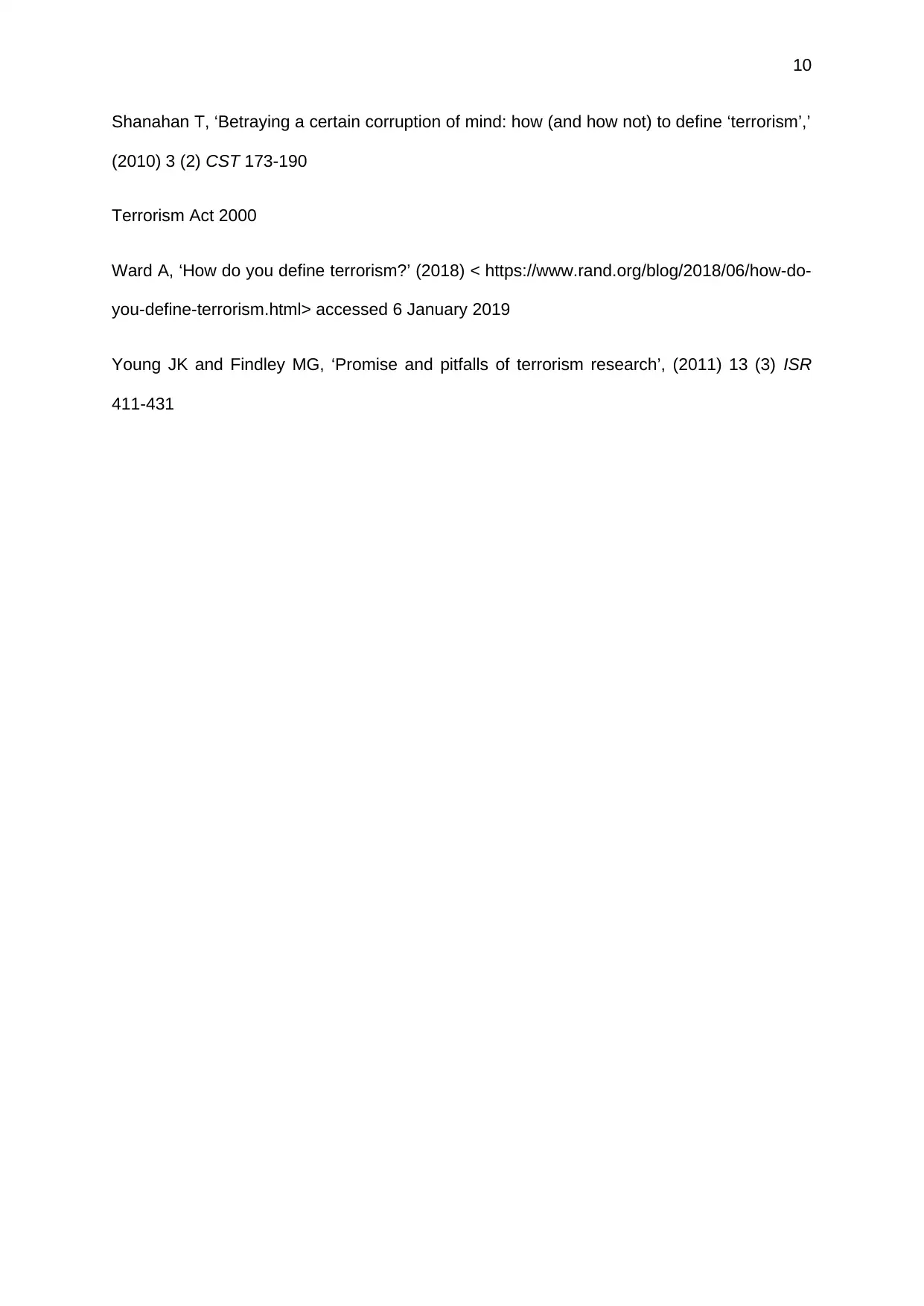
10
Shanahan T, ‘Betraying a certain corruption of mind: how (and how not) to define ‘terrorism’,’
(2010) 3 (2) CST 173-190
Terrorism Act 2000
Ward A, ‘How do you define terrorism?’ (2018) < https://www.rand.org/blog/2018/06/how-do-
you-define-terrorism.html> accessed 6 January 2019
Young JK and Findley MG, ‘Promise and pitfalls of terrorism research’, (2011) 13 (3) ISR
411-431
Shanahan T, ‘Betraying a certain corruption of mind: how (and how not) to define ‘terrorism’,’
(2010) 3 (2) CST 173-190
Terrorism Act 2000
Ward A, ‘How do you define terrorism?’ (2018) < https://www.rand.org/blog/2018/06/how-do-
you-define-terrorism.html> accessed 6 January 2019
Young JK and Findley MG, ‘Promise and pitfalls of terrorism research’, (2011) 13 (3) ISR
411-431
1 out of 11
Related Documents
Your All-in-One AI-Powered Toolkit for Academic Success.
+13062052269
info@desklib.com
Available 24*7 on WhatsApp / Email
![[object Object]](/_next/static/media/star-bottom.7253800d.svg)
Unlock your academic potential
Copyright © 2020–2026 A2Z Services. All Rights Reserved. Developed and managed by ZUCOL.




